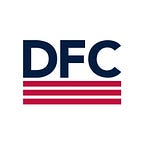On Africa Week, a look at the opportunities that transcend borders
By Algene Sajery, Vice President of External Affairs and Head of Global Gender Equity Initiatives and Amana Bawa, Development Specialist
Every year on Africa Day, the countries of the African Union celebrate their independence and their progress in charting the course to a more healthy, peaceful, and prosperous future.
As members of the African diaspora who recently joined DFC to work on global development, we know that Africa Day is a day of importance not only within Africa but also around the world, an increasingly connected world that often enjoys shared progress, yet also shares several challenges that require urgent attention. This has perhaps never been more apparent than in the current moment as the world confronts a pandemic that has killed millions, devastated families, impacted economies, and redefined the way we all live and work.
COVID-19 has highlighted how major events can transcend borders. At the same time, it has also underscored significant disparities in resources. While no country has avoided the pandemic, limited access to healthcare, vaccines, and basic services like clean water and electricity has significantly compounded the threat in much of Africa and other developing countries.
Even before COVID, the growing threat of climate change presented a similar challenge, one that has spared no country, but has left the world’s developing countries particularly at risk. In Africa and much of the developing world, communities often lack the infrastructure to withstand storms and small farmers need better technology to respond to shifting weather patterns. In these places, climate change is not a looming emergency but a current challenge.
This year, as the pandemic keeps Africa Day celebrations virtual, U.S. development efforts are focused on addressing these disparities by helping the emerging economies of Africa and around the world access more vaccines and strengthen their critical infrastructure to prepare for future pandemics. The U.S. is also also taking a bold approach to climate, committing to not only invest in climate mitigation but to help the world’s most vulnerable communities adapt to the changes they are already experiencing. While investments in renewable energy will help reduce emissions over time, investments in projects that will protect fragile ecosystems, strengthen infrastructure, and give farmers the training and technology to weather periods of drought and flooding will help communities adapt to the climate crisis today.
As African diasporans, our work at U.S. International Development Finance Corporation (DFC) is personal to us. DFC has a long history (together with its predecessor agency the Overseas Private Investment Corporation and the U.S. Agency for International Development’s Development Credit Authority) of investing in Africa, dating almost back to the first Africa Day in 1963.
Over the decades, our work has embodied the spirit of Africa Day by helping countries attract investment to build hospitals and power plants, expand access to essential services, create jobs, and grow their economies.
Today DFC is working to partner with more African businesses, which will have a profound impact on our work in addressing some of the most critical challenges facing the world today. To create more opportunities for partnership with local companies, DFC launched a series of town halls to share information with local businesses in Africa about DFC’s investment tools and how to work best with agency. Since September 2020, over 600 local businesses across nine countries in sub-Saharan Africa, including Liberia, Tanzania, and Rwanda, have attended DFC town halls. And this is only the start. DFC expects to expand its outreach to local businesses in emerging markets and to identify viable projects eligible for DFC support, targeting local entrepreneurs, including women-owned businesses and firms owned by other underserved groups in order to truly enable DFC to diversify its clientele and subsequently address inequities across economies.
DFC will continue to prioritize efforts to break down barriers to access private capital and will advance inclusive growth globally.
Over the years, Africa’s shared destiny with the rest of the world has become more apparent. Increased prosperity in many African cities has opened markets, expanded trade, and created opportunities around the world. The reverse is also true: Today, our ability to effectively confront COVID, the changing climate, and other major challenges will depend on us taking a coordinated global effort that protects the most vulnerable.
58 years ago, the diverse countries of Africa joined forces in a show of unity that would ultimately lead to the creation of the African Union. A similar spirit of collaboration will be essential as the world tackles the biggest issues of the 21st century.
We know that that collaboration does not begin and end at the project level but must be weaved throughout the operations and strategy of the agency. Our work at DFC signals our decision to help create the enabling environment so that the next generation of African leaders and entrepreneurs continue to have access to the right tools, finance, and opportunities to bolster innovation across the continent.
This work honors our grandmothers and grandfathers whose life lessons shaped generations to come — instilling a sense of pride, perseverance, and community in us all. Being a descendent and student of the diaspora is a privilege and it remains our duty to drive forward partnerships to help build a better community for those who will come after us.
